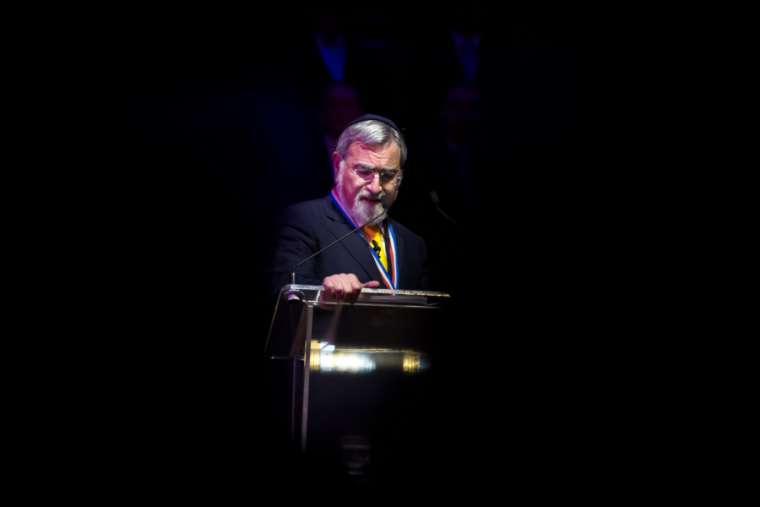Rabbi Jonathan Lord Sacks speaks after receiving the Templeton Prize May 26, 2016. Credit: Mazur/catholicnews.org.uk.
Archbishop McDonald said yesterday that the late Rabbi Jonathan Lord Sacks helped to advance Catholic-Jewish relations in harmony with St. John Paul II and Pope Francis.
Archbishop Kevin McDonald, chairman of the English and Welsh bishops’ Committee for Catholic-Jewish Relations, hailed the U.K.’s former chief rabbi as a wise, prophetic, and inclusive leader.
Rabbi Jonathan Lord Sacks died 7 November at the age of 72, after being diagnosed with cancer last month. He was buried in small ceremony a day later.
Archbishop McDonald, the emeritus archbishop of Southwark, told CNA “I would say that one of the main contributions Jonathan Sacks made to Catholic-Jewish relations was that he understood and appropriated the importance of ‘Nostra aetate.’ That document, published in 1965, was a defining document for Catholic-Jewish relations and, indeed, for Christian-Jewish relations generally.”
“In the present climate it is good to recall that in ‘Nostra aetate,’ the Church opposed anti-Semitism not on political grounds but on the grounds of the familial relationship between Christianity and Judaism. The Jews are our older brothers and sisters. Our roots are in Judaism and with the Jews we look forward to the final fulfillment of God’s promises. I am sure that teaching found a real echo in the heart and mind of Jonathan Sacks.”
Archbishop McDonald made the comments after Cardinal Vincent Nichols led Catholic tributes to Jonathan Sacks, who served as the Chief Rabbi of the United Hebrew Congregations of the Commonwealth from 1991 to 2013.
Cardinal Nichols, the president of the English and Welsh bishops’ conference, said 7 November that Jonathan Sacks was “a most eloquent proponent of some of the greatest truths of humanity.”
“I have lost a friend; the Jewish community a great leader; humanity an eloquent spokesman,” he commented.
Cardinal Nichols recalled that Jonathan Sacks spoke alongside Benedict XVI during the papal visit to Britain in 2010, highlighting the importance of peace among the adherents of different religions.
Archbishop McDonald told CNA that he saw parallels between the thinking of Jonathan Sacks and that of St. John Paul, who served as pope from 1978 to 2005.
He said: “During the pontificate of Pope John Paul II, I was working in Rome and I feel there were affinities between the pope and Rabbi Sacks. Pope John Paul convened the historic meeting in Assisi in 1986 at which he invited leaders of different religions to come together — not to pray together but to come together to pray.”
“For Pope John Paul, the convening of that gathering was integral to his mission and to his role. In particular, he understood that for there to be peace in the world there must be peace between religions. Rabbi Sacks also reached out in his heart and mind to all humanity and all religions.”
Archbishop McDonald continued: “Pope John Paul, of course, understood the vital connection between Christians and Jews, and his many initiatives and statements bore witness to that. But this was also connected to his global outreach to other faiths. It was within that outreach that the Jews had a special place.”
“Jonathan Sacks also had a global outlook. His book ‘The Dignity of Difference’ was all about how there need not be a ‘clash of civilizations’ between the different religions of the world. He also understood that fidelity to one’s own faith need not involve an adversarial attitude to people of other faiths.”
The 73-year-old archbishop, who oversaw Southwark archdiocese from 2003 to 2009, also compared Sacks’ teaching to that of Pope Francis.
He said: “I also see an affinity between the thinking of Rabbi Sacks and that of Pope Francis who in his ‘Urbi et Orbi’ address early in the pandemic and in his encyclicals ‘Laudato si’’ and ‘Fratelli tutti’ has insisted on the connectedness of all life and all humanity.”
“I would say that the legacy of Jonathan Sacks is that of a religious leader who could speak wisely and prophetically and inclusively not only to his own religious community but to all humanity. But he did not do this in isolation. He contributed his unique spiritual and intellectual gifts to the search for peace and reconciliation in a troubled world.”
Source: CNA

